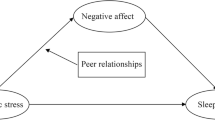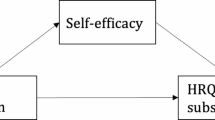Abstract
This study explored the relationship between classroom environment and perceived sleep disturbance in adolescents and tested the mediating and moderating roles of perfectionism in this relationship. A sample group of 2286 Chinese adolescents with a mean age of 15.0 years (SD = 1.7, ranging from 11 to 18) was recruited from 48 classes, via cluster sampling. These students completed the “My Class” questionnaire, Pittsburgh Sleep Quality Index (PSQI), and Almost Perfectionism Scale-Revised (APS-R). Their responses were analyzed by employing a structural equation model (SEM). The results show that the classroom environment was negatively associated with perceived sleep disturbance. Also, the relationship between classroom environment and perceived sleep quality was mediated by adaptive perfectionism. These conclusions suggest that a positive classroom environment and constructive perfectionism may be beneficial for adolescent sleep quality.

Similar content being viewed by others
References
Azevedo, M. H., Bos, S. C., Soares, M. J., Marques, M., Pereira, A. T., Maia, B., … & Macedo, A. (2010). Longitudinal study on perfectionism and sleep disturbance. The World Journal of Biological Psychiatry, 11(2), 476–485.
Bartel, K. A., Gradisar, M., & Williamson, P. (2015). Protective and risk factors for adolescent sleep: A meta-analytic review. Sleep Medicine Reviews, 21, 72–85.
Barth, J. M., Dunlap, S. T., Dane, H., Lochman, J. E., & Wells, K. C. (2004). Classroom environment influences on aggression, peer relations, and academic focus. Journal of School Psychology, 42(2), 115–133.
Bergman, A. J., Nyland, J. E., & Burns, L. R. (2007). Correlates with perfectionism and the utility of a dual process model. Personality and Individual Differences, 43(2), 389–399.
Bonnar, D., Gradisar, M., Moseley, L., Coughlin, A.-M., Cain, N., & Short, M. A. (2015). Evaluation of novel school-based interventions for adolescent sleep problems: Does parental involvement and bright light improve outcomes? Sleep Health, 1(1), 66–74.
Brand, S., Kirov, R., Kalak, N., Gerber, M., Pühse, U., Lemola, S., … Holsboer-Trachsler, E. (2015). Perfectionism related to self-reported insomnia severity, but not when controlled for stress and emotion regulation. Neuropsychiatric Disease and Treatment, 11, 263–271.
Buysse, D. J., Reynolds Iii, C. F., Monk, T. H., Berman, S. R., & Kupfer, D. J. (1989). The Pittsburgh sleep quality index: A new instrument for psychiatric practice and research. Psychiatry Research, 28(2), 193–213.
Cassoff, J., Knäuper, B., Michaelsen, S., & Gruber, R. (2013). School-based sleep promotion programs: Effectiveness, feasibility and insights for future research. Sleep Medicine Reviews, 17(3), 207–214.
Chartrand, J. M. (1991). The evolution of trait-and-factor career counseling: A person*environment fit approach. Journal of Counseling & Development, 69, 518–524.
China Youth and Children Research Center. (2011). Study on the development of Chinese adolescents and children during the past ten years (1999–2010) (in Chinese). Beijing: People Daily Press.
DiLalla, L. F., & Mullineaux, P. Y. (2008). The effect of classroom environment on problem behaviors: A twin study. Journal of School Psychology, 46(2), 107–128.
Gradisar, M., Gardner, G., & Dohnt, H. (2011). Recent worldwide sleep patterns and problems during adolescence: A review and meta-analysis of age, region, and sleep. Sleep Medicine, 12(2), 110–118.
Guo, B.-L., Wang, Y., & Chang, L. (2005). Classroom effects on the relationship between children’s social behaviors and school adjustment (in Chinese). Acta Psychologica Sinica, 37(2), 233–239.
Harvey, C.-J., Gehrman, P., & Espie, C. A. (2014). Who is predisposed to insomnia: A review of familial aggregation, stress-reactivity, personality and coping style. Sleep Medicine Reviews, 18(3), 237–247.
Hau, K.-T., Wen, z.-L., & Wen, Z.-J. (2004). Structural Equation Model and its Applications (in Chinese). Beijing: Educational Science Publishing House.
Jansson-Fröjmark, M., & Linton, S. J. (2007). Is perfectionism related to pre-existing and future insomnia? A prospective study. British Journal of Clinical Psychology, 46(1), 119–124.
Jiang, G.-R. (2004). Class environment in the Chinese school system: Structural and measurement (in Chinese). Journal of Psychological Science, 27(4), 83–843.
Jiang, G.-R., & Lin, M.-P. (2005). Class environments and students’ adaptability: A hierarchical linear model (in Chinese). Journal of Psychological Science, 28(6), 1443–1448.
Karabenick, S. A. (1994). Relation of perceived teacher support of student questioning to students' beliefs about teacher attributions for questioning and perceived classroom learning environment. Learning and Individual Differences, 6(2), 187–204.
Lei, L., Wang, Y., Guo, B.-L., & Chang, L. (2004). The influence of classroom norms on the relations between social behaviors and peer victimization (in Chinese). Acta Psychologica Sinica, 36(5), 563–567.
Lin, R.-M., Yan, Y.-W., & Tang, X.-D. (2010). A meta-analysis of sleep quality studies with Pittsburgh sleep quality index in young students over the past 15 years in China (in Chinese). Chinese Mental Health Journal, 24(11), 839–844.
Lin, R.-M., Xie, S.-S., Yan, Y.-W., Chen, Y.-H., & Yan, W.-J. (2017). Perfectionism and adolescent sleep quality: The mediating role of repetitive negative thinking. Journal of Health Psychology, 1359105317693914.
Linton, S. J., Kecklund, G., Franklin, K. A., Leissner, L. C., Sivertsen, B., Lindberg, E., … Hall, C. (2014). The effect of the work environment on future sleep disturbances: A systematic review. Sleep Medicine Reviews, 23, 10–19.
Liu, X.-C., Tang, M.-Q., Hu, L., Wang, A.-Z., Zhao, G.-F., Gao, C.-N., & Li, W.-S. (1996). Reliability and validity of the Pittsburgh sleep quality index (in Chinese). Chinese Journal of Psychiatry, 39(2), 103–107.
López, E., Pérez, S. M., Ochoa, G. M., & Ruiz, D. M. (2008). Adolescent aggression: Effects of gender and family and school environments. Journal of Adolescence, 31(4), 433–450.
Lundh, L.-G., Broman, J.-E., Hetta, J., & Saboonchi, F. (1994). Perfectionism and insomnia. Cognitive Behaviour Therapy, 23(1), 13–18.
McBride, R., & Bonnette, R. (1995). Teacher and at-risk students' cognitions during open-ended activities: Structuring the learning environment for critical thinking. Teaching and Teacher Education, 11(4), 373–388.
Onishi, A., Kawabata, Y., Kurokawa, M., & Yoshida, T. (2012). A mediating model of relational aggression, narcissistic orientations, guilt feelings, and perceived classroom norms. School Psychology International, 33(4), 367–390.
Park, H.-j., & Jeong, D. Y. (2015). Psychological well-being, life satisfaction, and self-esteem among adaptive perfectionists, maladaptive perfectionists, and nonperfectionists. Personality and Individual Differences, 72, 165–170.
Pawlowska, D. K., Westerman, J. W., Bergman, S. M., & Huelsman, T. J. (2014). Student personality, classroom environment, and student outcomes: A person–environment fit analysis. Learning and Individual Differences, 36, 180–193.
Perkinson-Gloor, N., Lemola, S., & Grob, A. (2013). Sleep duration, positive attitude toward life, and academic achievement: The role of daytime tiredness, behavioral persistence, and school start times. Journal of Adolescence, 36(2), 311–318.
Ren, Z.-H., Jiang, G.-R., & Ye, Y.-D. (2011). The moderating and mediating effects of core self-evaluation on the relationship between environment and adolescent depression. Journal of Psychological Science, 34(5), 1106–1112.
Shafran, R., Egan, S., & Wade, T. (2010). Overcoming perfectionism: A self-help guide using cognitive behavioral techniques. London: Robinson.
Shochat, T., Cohen-Zion, M., & Tzischinsky, O. (2014). Functional consequences of inadequate sleep in adolescents: A systematic review. Sleep Medicine Reviews, 18(1), 75–87.
Short, M. A., Gradisar, M., Lack, L. C., & Wright, H. R. (2013). The impact of sleep on adolescent depressed mood, alertness and academic performance. Journal of Adolescence, 36(6), 1025–1033.
Slaney, R. B., Rice, K. G., Mobley, M., Trippi, J., & Ashby, J. S. (2001). The revised almost perfect scale. Measurement and Evaluation in Counseling and Development, 34, 130–145.
Spielman, A., Caruso, L., & Glovinsky, P. (1987). A behavioral perspective on insomnia treatment. Psychiatric Clinics of North America, 10(4), 541–553.
Torsheim, T., & Wold, B. (2001). School-related stress, support, and subjective health complaints among early adolescents: A multilevel approach. Journal of Adolescence, 24(6), 701–713.
van de Laar, M., Verbeek, I., Pevernagie, D., Aldenkamp, A., & Overeem, S. (2010). The role of personality traits in insomnia. Sleep Medicine Reviews, 14(1), 61–68.
Vincent, N. K., & Walker, J. R. (2000). Perfectionism and chronic insomnia. Journal of Psychosomatic Research, 49, 349–354.
Wang, J. (2012). Class psychology. Beijing: Kaiming Press.
Wen, Z.-L., & Ye, B.-J. (2014). Analyses of mediating effects: The development of methods and models (in Chinese). Advances in Psychological Science, 22(5), 731–745.
Wen, Z.-L., Chang, L., Hau, K.-T., & Liu, H.-Y. (2004). Testing and application of the mediating effects (in Chinese). Acta Psychologica Sinica, 36(5), 614–620.
Wigert, B., Reiter-Palmon, R., Kaufman, J. C., & Silvia, P. J. (2012). Perfectionism: The good, the bad, and the creative. Journal of Research in Personality, 46(6), 775–779.
Yan, Y.-W., Liu, M.-Y., Tang, X.-D., & Lin, R.-M. (2010). On the stressors and its phenomenological relationship with sleep quality. Advances in Psychological Science, 18(10), 1537–1547.
Yang, L., Liang, B., Zhang, X., & Wu, Y. (2007). The Chinese version of almost perfect scale-revised (in Chinese). Studies of Psychology and Behavior, 5(2), 139–144.
Zhang, G.-H., Dai, B.-B., & Lei, L. (2013). The development of pathological internet use and its relationship with self-esteem among junior high school students: The moderating role of classmate relationship (in Chinese). Acta Psychologica Sinica, 45(12), 1345–1354.
Author information
Authors and Affiliations
Corresponding author
Ethics declarations
Conflict of Interest
On behalf of all the authors, the corresponding author states that there was no conflict of interest.
Ethical Approval
All procedures were approved by the Academic Ethics Committee of Fujian Normal University.
Informed Consent
Written informed consent was obtained from each participant, his/her teacher, and his/her guardian.
Electronic Supplementary Material
ESM 1
(DOC 115 kb)
Rights and permissions
About this article
Cite this article
Xie, SS., Lian, KY. & Lin, RM. Classroom environment and perceived sleep disturbance in adolescents: Test of the mediating and moderating roles of perfectionism. Curr Psychol 39, 1732–1739 (2020). https://doi.org/10.1007/s12144-018-9872-0
Published:
Issue Date:
DOI: https://doi.org/10.1007/s12144-018-9872-0




